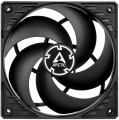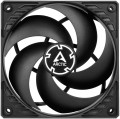Max. RPM
The highest speed at which the cooling system fan is capable of operating; for models without a speed controller (see below), this item indicates the nominal rotation speed. In the "slowest" modern fans, the maximum speed
does not exceed 1000 rpm, in the "fastest" it can be up
to 2500 rpm and even
more.
Note that this parameter is closely related to the fan diameter (see above): the smaller the diameter, the higher the speed must be to achieve the desired airflow values. In this case, the rotation speed directly affects the level of noise and vibration. Therefore, it is believed that the required volume of air is best provided by large and relatively "slow" fans; and it makes sense to use "fast" small models where compactness is crucial. If we compare the speed of models of the same size, then higher speeds have a positive effect on performance, but increase not only the noise level, but also the price and power consumption.
Max. air flow
The maximum airflow that a cooling fan can create; measured in CFM — cubic feet per minute.
The higher the CFM number, the more efficient the fan. On the other hand, high performance requires either a large diameter (which affects the size and cost) or high speed (which increases the noise and vibration levels). Therefore, when choosing, it makes sense not to chase the maximum air flow, but to use special formulas that allow you to calculate the required number of CFM depending on the type and power of the cooled component and other parameters. Such formulas can be found in special sources. As for specific numbers, in the most modest systems, the performance
does not exceed 30 CFM, and in the most powerful systems it can be up to 80 CFM and even
more.
It is also worth considering that the actual value of the air flow at the highest speed is usually lower than the claimed maximum; see Static Pressure for details.
Static pressure
The maximum static air pressure generated by the fan during operation.
This parameter is measured as follows: if the fan is installed on a blind pipe, from which there is no air outlet, and turned on for blowing, then the pressure reached in the pipe will correspond to the static one. In fact, this parameter determines the overall efficiency of the fan: the higher the static pressure (ceteris paribus), the easier it is for the fan to “push” the required amount of air through a space with high resistance, for example, through narrow slots of a radiator or through a case full of components.
Also, this parameter is used for some specific calculations, however, these calculations are quite complex and, usually, are not necessary for an ordinary user — they are associated with nuances that are relevant mainly for computer enthusiasts. You can read more about this in special sources.
Starting voltage
The starting voltage of the fan installed in the cooling system. In fact, this is the smallest value necessary for stable operation of the fan — if the voltage is too low, it simply “will not start”. Note that this parameter is relevant mainly for rather specific tasks — for example, installing a fan in a power supply unit with a direct connection to the PSU, or choosing an external controller to control the rotation speed. When connected through standard power connectors, you can not pay much attention to the starting voltage.

